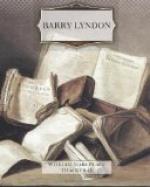|
This section contains 4,344 words (approx. 15 pages at 300 words per page) |

|
SOURCE: “Narrative and Discourse in Kubrick's Modern Tragedy,” in The English Novel and the Movies, edited by Michael Klein and Gillian Parker, Frederick Ungar Publishing, pp. 95-107.
In the following essay, Klein elucidates the unique nature of Kubrick's modernist perspective, as evinced through his film Barry Lyndon.
Even inept films sometimes carry with them a certain mesmerizing authority. Stanley Kubrick's Barry Lyndon, a flawed work based upon a rather uninspiring novel, can be enjoyed, for instance, for its visual effects: sheer photography. And the background music is superb.1
The music offputtingly classical under the titles … might as well be embalming fluid. … Even the action sequences in Barry Lyndon aren't meant to be exciting; they're meant only to be visually exciting.2
The quotations are typical of a good deal that has been written about Kubrick's film, Barry Lyndon. Joyce Carol Oates, writing in TV Guide, liked the “visual effects...
|
This section contains 4,344 words (approx. 15 pages at 300 words per page) |

|


